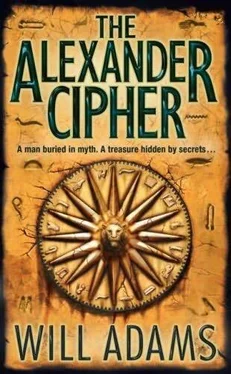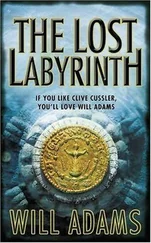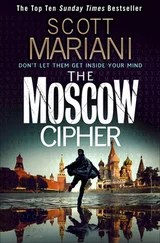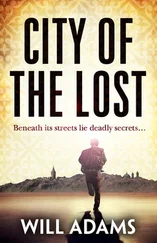Will Adams - The Alexander Cipher
Здесь есть возможность читать онлайн «Will Adams - The Alexander Cipher» — ознакомительный отрывок электронной книги совершенно бесплатно, а после прочтения отрывка купить полную версию. В некоторых случаях можно слушать аудио, скачать через торрент в формате fb2 и присутствует краткое содержание. Жанр: Прочие приключения, на английском языке. Описание произведения, (предисловие) а так же отзывы посетителей доступны на портале библиотеки ЛибКат.
- Название:The Alexander Cipher
- Автор:
- Жанр:
- Год:неизвестен
- ISBN:нет данных
- Рейтинг книги:5 / 5. Голосов: 1
-
Избранное:Добавить в избранное
- Отзывы:
-
Ваша оценка:
- 100
- 1
- 2
- 3
- 4
- 5
The Alexander Cipher: краткое содержание, описание и аннотация
Предлагаем к чтению аннотацию, описание, краткое содержание или предисловие (зависит от того, что написал сам автор книги «The Alexander Cipher»). Если вы не нашли необходимую информацию о книге — напишите в комментариях, мы постараемся отыскать её.
The Alexander Cipher — читать онлайн ознакомительный отрывок
Ниже представлен текст книги, разбитый по страницам. Система сохранения места последней прочитанной страницы, позволяет с удобством читать онлайн бесплатно книгу «The Alexander Cipher», без необходимости каждый раз заново искать на чём Вы остановились. Поставьте закладку, и сможете в любой момент перейти на страницу, на которой закончили чтение.
Интервал:
Закладка:
"He's in the vaults," replied Costis.
Nicolas nodded at Julia. "Perhaps I can take you back to town later."
"Thanks," she said warily. "But I'm sure I can get a taxi."
He laughed again, enjoying her discomfort. She'd looked troubled ever since he told her about the Aristander prophecy. Westerners today! They took fright at the merest hint of the sacred. It was just as well that she hadn't been in church last night, that he hadn't told her about the book of Daniel-the full prophecy, that is, including the description of the man predicted to bring about Macedonian liberation.
The only way to reach the vaults was via a secure elevator. Nicolas stepped into it now; the steel doors closed smoothly. He presented his eyes to the retinal scanner; then it began its slow descent, shuddering a little under its own weight when it came to a halt. An armed guard was stationed by the vault, where his father kept all his greatest treasures. Nicolas punched in his code, and the steel door opened. He went through, still thinking about the book of Daniel, and particularly those verses that, twenty-five hundred years before, had promised his people a savior.
And in the latter time of their kingdom, when the transgressors are come to the full, a king of fierce countenance, and understanding dark sentences, shall stand up.
And his power shall be mighty, but not by his own power: and he shall destroy wonderfully, and shall prosper, and practice.
And through his policy also he shall cause craft to prosper in his hand; and he shall magnify himself in his heart, and by peace he shall destroy.
His father, as if by some kind of telepathy, was already standing in front of the glass-topped cabinet in which were displayed a few samples of the Mallawi papyri, his hands resting like a priest's on the walnut frame as he gazed down at the yellowed reeds and the faded black writing. A feeling of intense love, awe, and pride burned in Nicolas's chest when he beheld him. A king of fierce countenance indeed!
Dragoumis looked up and drilled his son with his emotionless black eyes. "Yes?" he asked.
"They've found Akylos," Nicolas blurted, his excitement almost too much. "It's started."
Chapter Eight
A blue truck cut in front of Elena as she drove back south to the Delta, forcing her to slam on her brakes. She blasted her horn until the truck moved aside; then she wound down her window, shook her fist, and yelled some choice Arabic phrases at the bewildered driver. She was in a troubled mood. It was speaking to Nicolas that had done it. That, and that damned Frenchman. So smug. Between them, they'd stirred memories of her late husband, Pavlos, and Elena hated that, because it just reminded her of her loss.
She'd known of Pavlos long before she'd ever met him, had been infuriated and entertained in equal measure by the tone, anger, and wit of his articles ridiculing Macedonian nationalism. She'd been intrigued, too, by the gossip of besotted women throwing themselves at him. She was a proud and independent woman herself, and like so many of her kind, she had yearned to fall helplessly in love. They had finally met on either side of a radio debate in Thessalonike, and he had surprised her from the start. She had expected someone sharp, assertive, dressy, plausible, but Pavlos hadn't been like that at all. Though he wasn't exactly arrogant, she had never met a man so confident of himself. She knew from their first handshake that she was in trouble. He had an unsettling way of looking at her, then and later, as though she were completely exposed to him, as though he understood not just everything she said but all its subtext, too. He had watched her as though she were a movie, one he had seen before.
He had trodden all over her in their debate, defusing her best arguments with humor, hammering relentlessly at her weakest points. Disconcerted, she tried to press him back by citing Keramopoullos on the idiosyncratic style of Macedonian ceramics, before remembering that the words had come from Kallipolitis. She glanced up fearfully to see him grin, and for a terrible moment her scholarly reputation had been at his mercy. That moment-the moment of being at his mercy-had changed her life.
For two days after the debate, Elena had wandered her museum from room to room, hugging herself like an addict. Each time she tried to work, a craving like hunger would disturb her. She had never needed to call men, but she called Pavlos. Scared he would mock her, she introduced herself brusquely, remarked that he had raised interesting points in the debate. He thanked her. Then her nerve had failed. She held the phone against her cheek, wanting to say something clever or hurtful but not knowing what. When he asked her to have dinner with him, she could have cried.
How had it been? It had been everything. She remembered little of the detail, as though the intensity of her love had simply been too much for her memory. But she could remember the joy of it. Even now sometimes, she could experience an exquisite moment of bliss, catching sight of his double on the street, smelling his brand of cigarette in some passerby's hand, or having some man look at her in the way Pavlos had-as that arrogant Frenchman had, certain he could take her to bed whenever he damned well chose.
Pavlos's death had devastated Elena. Of course it had. She still hadn't recovered from it. How could she? Grief hadn't been as she imagined, any more than love had been. She had imagined grief as a great sea swell that lifted you into wretchedness for a while before setting you back down again much where you'd been before. But it hadn't been like that. Grief had changed the fabric of who she was as completely as blown carbon changes molten pig iron.
Yes, she thought, the metaphor worked: grief had turned her into steel.
The woman dropped the manila envelope through the open rear window of Nessim's Saab as he paused to buy a packet of cigarettes from a vendor. He drove off in a flurry of dust back to his hotel's underground parking lot, then took it up to his room to read. It was disappointingly thin, as files went, but then, he hadn't expected Knox to have a file at all. He flipped through the pages, the print barely legible from being photocopied too often, the photographs almost completely black.
It quickly became clear that the Security Service hadn't really been interested in Knox at all. They had been interested in another man, a Richard Mitchell, with whom Knox had worked for several years. Mitchell, it seemed, had a big mouth; he had accused the extremely well connected head of the SCA of selling papyri on the black market. A piece of recklessness that had achieved precisely what one would expect: his isolation from the Egyptological community and the refusal of any further permissions to excavate.
That at least explained what Knox had been doing in Sharm: killing time until the dust settled, dreaming of treasure on the seafloor. But it wasn't much help when it came to tracking him down. The last sheet in the file, however, was a different matter. It was a list of all Knox's known friends and associates, and it gave their home addresses, too.
Nur greeted Mohammed at the door. She looked haggard, which meant Layla had had a bad day. "You look beautiful," he said, kissing her cheek and handing her a small bouquet of tired blooms.
"How can you afford these?" she protested tearfully.
"They're a gift," he said gently. "Sharif wanted you to have them." He looked past her, down the hallway, to Layla's room. "Is she awake?"
Nur nodded. "But tired."
"I won't be long." He knocked gently on Layla's door, opened it, and walked in. His daughter smiled to see him. He knelt beside her bed, reached into his pocket, and produced a black queen he'd carved and varnished. He liked to whittle. In the rare lulls on-site, he would scour the bins for ends of wood that he could attack with his linoleum knife. It was good therapy. When you could do nothing for your child's health, you could at least do something for her happiness.
Читать дальшеИнтервал:
Закладка:
Похожие книги на «The Alexander Cipher»
Представляем Вашему вниманию похожие книги на «The Alexander Cipher» списком для выбора. Мы отобрали схожую по названию и смыслу литературу в надежде предоставить читателям больше вариантов отыскать новые, интересные, ещё непрочитанные произведения.
Обсуждение, отзывы о книге «The Alexander Cipher» и просто собственные мнения читателей. Оставьте ваши комментарии, напишите, что Вы думаете о произведении, его смысле или главных героях. Укажите что конкретно понравилось, а что нет, и почему Вы так считаете.












